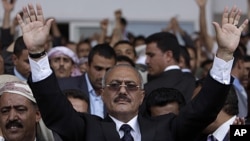Yemen's president, wounded Friday in a rocket attack on his compound, had survived three decades of challenges to his rule before injuries forced him to leave for medical treatment in Saudi Arabia.
President Ali Abdullah Saleh had ruled Yemen since the country's unification in 1990. He had served as leader of North Yemen since 1978 and he played a key role in the merger between the North and the communist South.
Saleh was one of Yemen's longest-serving leaders. He was re-elected to a seven-year term in 2006.
Saleh was challenged by al-Qaida militants, Shi'ite Zaidi rebels and anti-government protesters during his time in office.
He started his career in Yemen's military, where he rose through the ranks. He fought in a civil war that began in 1962.
Saleh is from a tribal branch that is part of the al-Ahmar family. However, tribal chief Sadiq al-Ahmar emerged as one of his most prominent challengers after anti-government unrest erupted in January.
In April, the six-nation Gulf Cooperation Council presented Saleh with a plan designed to end Yemen's unrest by providing for a timetable for Saleh to leave office and to clear the way for new elections. He declined to sign the agreement, even after several attempts by Gulf leaders to broker an end to the crisis.
Now, his vice president is in charge while Saleh undergoes treatment in Saudi Arabia for his wounds.
Some information for this report was provided by AFP and Reuters.




